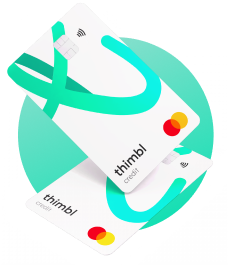Six ways to work towards a healthier credit position
How Long Does it Take to Improve Your Credit Score?
Understanding your credit score and what it means for you is an important part of managing your finances. Whether you’re hoping to improve a bad credit score or go from ‘good’ to ‘excellent,’ thimbl is pleased to provide a guide to help you start your journey towards a healthier credit position.




The information contained in this article is meant as a general guide and does not constitute nor should be taken as advice.
What is a credit score?
Your credit score is a number based on your financial history.
When you apply to borrow credit, such as a loan, credit card, or mortgage, lenders and credit providers will look at your credit score and use it to determine your ‘creditworthiness’.
Your creditworthiness is a measure of how likely you are to be able to repay the money you borrow.
Generally, the higher your credit score, the better your chance of being eligible to apply for credit. It’s important to remember that all credit applications will be subject to the lender’s affordability checks.
A good credit score could also mean that you’re able to access a better rate of interest.
What’s considered a good credit score?
There are three main credit reference agencies (CRAs) in the UK: Experian, Equifax, and TransUnion. Each CRA has their own scoring system, which is one of the reasons you may notice that your credit score can differ between sites.
With this in mind, what is considered a ‘good’ credit score with one CRA may not necessarily be the same on another.
We’ve broken down the credit score brackets for each CRA below.
| Credit Score | Credit Rating |
|---|---|
| 1121 - 1250 | Excellent |
| 1001 - 1120 | Very good |
| 861 - 1000 | Good |
| 641 - 860 | Fair |
| 0 - 640 | Low |
| Credit Score | Credit Rating |
|---|---|
| 811 - 1,000 | Excellent |
| 671 - 810 | Very good |
| 531 - 670 | Good |
| 439 - 530 | Fair |
| 0 - 438 | Poor |
| Credit Score | Credit Rating |
|---|---|
| 628 - 710 | Excellent |
| 604 - 627 | Good |
| 566 - 603 | Fair |
| 551 - 565 | Poor |
| 0 - 550 | Very poor |
What causes a bad credit score?
A bad credit score could be caused by a number of things, including:
- Making late repayments or missing them altogether.
- Being declared bankrupt.
- Applying for an individual voluntary arrangement (IVA).
- Receiving a county court judgement (CCJ).
- Moving house more than once in a short space of time.
- Using your credit card to withdraw money from cash machines; this is known as a ‘cash advance.’
- Making several applications for credit in a short space of time.
Your credit score may also be low if you have no credit history at all. This is often referred to as having a ‘thin’ credit file and may occur if you’ve never borrowed credit or paid bills before.
How long does it take to improve your credit score?
There is no ‘one size fits all’ answer to this question. It could take anywhere from a couple of months to several years to improve your credit score. The time it takes will depend on several factors, including your current financial situation.
For instance, if your credit score is low as a result of a CCJ or IVA, you should bear in mind that these will remain on your credit file for six years. Once the six years has passed and the CCJ or IVA has been removed, you could notice an improvement in your credit score.
The journey towards a better credit position takes time, but it will be worth the work. It’s important to be patient and consistent.
How long does it take to build credit?
It could take several months to build up a thin credit file from scratch and establish a credit history, but again, this will depend on your individual circumstances and the actions you take.
What can I do to improve and build my credit score?
While having a bad credit score can feel disheartening, it’s important to remember that credit-building methods do not necessarily have to be difficult or time-consuming. Some of the ways you can improve your credit score may surprise you - for example, did you know that registering to vote could help?
Here are some other ways that you can work towards a healthier credit position.
- Pay your bills on time. If you think you might forget to make a payment, you may wish to consider setting up a Direct Debit or setting yourself a calendar reminder.
- Think carefully before opening a joint account. Financial association, such as holding a joint account with somebody who has poor credit history, could have a negative impact on your own score.
- When you apply for credit, the lender or credit provider will carry out a creditworthiness assessment as part of the application process. A creditworthiness assessment will include a hard search or a check powered by Open Banking. Please be aware that a hard search will remain on your credit file for up to 12 months, and multiple hard searches within a short period of time could have a negative effect on your credit score. Try to limit the number of credit applications you make.
- Have you got a credit card? If so, be sure to stay well within your credit limit, and if you can, you should aim to make more than the minimum repayment amount each month. You should also avoid using your credit card to withdraw money from a cash machine.
- Credit card utilisation is the amount of money you’re borrowing on your credit card compared with your credit limit and is shown as a percentage. When looking to improve your credit score, you should try to keep your credit card utilisation as low as possible.
- Thin credit file? Perhaps you’ve thought about looking into credit builder credit cards, which aim to help you do just that: build your credit. Use this type of credit card to make small, manageable purchases, and then repay your balance in full each month. Credit builder credit cards usually come with a low credit limit to encourage you to stay in control of your spending.
Could a thimbl Credit Builder Credit Card help me improve my credit score?
The thimbl Credit Builder Credit Card comes with a manageable starting credit limit from £200 up to £2,000. When used responsibly, the thimbl Credit Builder Credit Card could help you work towards a healthier credit position.
A credit builder credit card should be used alongside other credit-building methods, such as paying your bills on time and checking your credit report for errors.
You can check your eligibility for a thimbl credit card if you:
- Are between the ages of 18 and 70;
- Are a UK resident with at least 1 year's UK address history;
- Have a monthly net income of at least £800;
- Have an active credit account that has been open for a minimum of 12 months; and
- Do not already hold a Zable credit card.
Lendable Ltd is unable to consider applications from anyone who has declared bankruptcy or is in an Individual Voluntary Arrangement (IVA).*
*The thimbl credit card is powered by Zable. Zable is a trading style of Lendable Ltd. If you choose to make a full application, a creditworthiness assessment will be carried out by Zable. This will consist of a hard search and a further check powered by Open Banking. A hard search will remain on your credit file for up to 12 months, and multiple hard searches within a short period of time could have a negative impact on your credit score. Any credit obtained upon successful application will be provided by Lendable Ltd.
The bottom line
It’s important to remember that improving and building your credit score doesn’t happen overnight, so you shouldn’t feel deflated if you don’t see a change straightaway.
Be persistent with your credit-boosting methods and practise positive financial habits, and in time, you should start to see your hard work pay off.
Worried about money?
We understand that money worries can feel consuming and frightening, but please know that help is available.
You can access free, confidential money and debt management support through various charities including StepChange, MoneyHelper, Citizens Advice, and National Debtline.
The information contained in this article does not constitute advice and should not be viewed as such.
October 2024.

Page last reviewed: 7th October 2025
Page reviewed by: Harry Lawrance
You get all this with thimbl
Tap and go
Quick and easy contactless payments up to £100.
Secure banking app
Manage your credit card online, wherever and whenever you like, with the free mobile app.
A trusted service
Over 4,500 positive reviews from our customers.
48.9% APR Representative (variable)
Quick links








Worried about money?
If you're worried about the cost of living, need support with budgeting, or think you might need debt advice, StepChange could help. They offer free and impartial support and help hundreds of thousands of people every year to deal with their debts and take control of their finances.
To find out how StepChange could help you, take the free Money Health Check. It's quick and easy to complete, and will give you a personalised recommendation on what to do next.
Meet the team
Head of Compliance
Head of Partnerships
Managing Director, thimbl
Marketing Manager, thimbl
Financial Content Writer
Frequently asked
questions
If you've got a question, you may just find the answer you're looking for here. If not, please visit our contact us page and get in touch.
What will my credit limit be?
You will always be made aware of any credit limit changes to any credit cards you have beforehand, and you do not have to accept a credit limit increase if you don't feel it's right for you.
What happens if I fail to make my repayments?
Missed payments will be reported to the credit bureaus, and your account will appear as in arrears. You will be charged a late fee, which is usually around £12. Your credit rating is also likely to decline as a result.
You should try to make your missed payments as soon as possible.
If you're struggling to keep on top of your repayments, you can find free, impartial advice from MoneyHelper, StepChange, Citizens Advice and National Debtline
If you want to know more about how credit cards work, you can read our blog.
Did you find this article helpful?
Let us know how we can be more helpful
Please leave your anonymous feedback to help us keep improving.
Need help or support?
Whether it's a question or you just need support, we're here to help.







